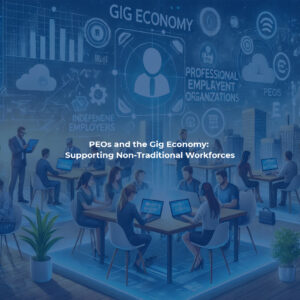The rise of the gig economy has transformed the way we think about work. Freelancers, independent contractors, and other non-traditional workers now make up a significant portion of the global workforce. This shift has brought about new challenges for businesses that rely on these workers, including compliance, benefits, and administrative management. Professional Employer Organizations (PEOs) offer an effective solution for navigating these complexities while supporting the unique needs of gig workers. Here’s how PEOs play a crucial role in the gig economy.
Understanding the Gig Economy
The gig economy encompasses a variety of non-traditional work arrangements, including freelance projects, short-term contracts, and part-time engagements. It thrives on flexibility and independence, making it attractive to workers who prioritize control over their schedules and work-life balance. For businesses, gig workers provide a scalable and diverse talent pool to address short-term needs or specialized skills.
However, managing a gig workforce comes with its own set of challenges:
-
Compliance: Navigating labor laws and tax regulations that differ for gig workers compared to traditional employees.
-
Benefits: Providing competitive benefits while maintaining cost-efficiency.
-
Administration: Managing payroll, contracts, and other HR functions for a dispersed workforce.
How PEOs Support Non-Traditional Workforces
PEOs specialize in handling HR, payroll, compliance, and employee benefits. Here’s how they can specifically benefit businesses in the gig economy:
1. Streamlining Compliance
Compliance with labor laws is one of the biggest hurdles for businesses employing gig workers. Misclassifying workers can lead to hefty fines and legal complications. PEOs are experts in workforce compliance and can:
-
Ensure correct worker classification.
-
Handle tax reporting and filing for independent contractors.
-
Keep up-to-date with evolving labor laws to mitigate risks.
2. Offering Competitive Benefits
Attracting and retaining gig workers often depends on the benefits offered. PEOs provide access to:
-
Affordable health insurance plans.
-
Retirement savings options.
-
Wellness programs tailored to the needs of non-traditional workers.
By bundling benefits through a PEO, businesses can offer packages comparable to those for full-time employees, giving them a competitive edge in the gig economy.
3. Simplifying Administrative Tasks
PEOs take on the administrative burden of managing gig workers by:
-
Handling payroll and tax filings.
-
Generating and managing contracts.
-
Providing easy-to-use platforms for time tracking and payments.
This allows businesses to focus on their core operations while ensuring their gig workforce is managed efficiently.
4. Enhancing Worker Satisfaction
Gig workers value transparency and efficiency. PEOs enhance their experience by:
-
Offering self-service portals for accessing pay stubs, contracts, and benefits information.
-
Ensuring timely and accurate payments.
-
Providing support for disputes or issues, fostering trust and loyalty.
PEOs as Partners in the Future of Work
As the gig economy continues to expand, businesses must adapt to the needs of this dynamic workforce. PEOs act as strategic partners, helping companies overcome challenges and stay competitive. By leveraging the expertise of a PEO, businesses can:
-
Reduce administrative overhead.
-
Minimize compliance risks.
-
Build a strong, satisfied gig workforce.
The gig economy is here to stay, and businesses that embrace its opportunities must also address its challenges. PEOs provide a comprehensive solution for managing non-traditional workforces, allowing companies to stay focused on growth while meeting the needs of their gig workers. By partnering with a PEO, businesses can navigate the complexities of the gig economy with confidence and build a workforce ready for the future.

